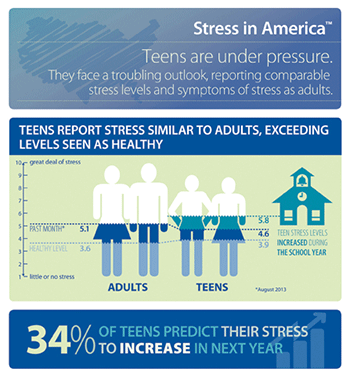Teen Stress Through The Roof

photo credit: American Psychology Association
March 17, 2020
After taking one of the hardest Calculus tests I had ever experienced last year, my first thought was that I just wanted to have done better than one of my friends. I had grown so used to comparing test scores and grades and then proceeding to make fun of whichever one of us performed the worst that I hadn’t realized that it was this kind of competitive behavior that results from the unhealthy academic environment that surrounds high schools today.
The amount of stress among high school teenagers has increased greatly as a consequence of the pressure of getting impressive grades and gaining admission to what is deemed an acceptable college. The burden of both parental and societal expectations when coming to academic success has existed for decades, but it has recently hit an all-time high.
With college admissions being more competitive than ever, teenagers are now generally expected to do multiple extracurricular activities, have an impressive GPA., and volunteer in their spare time to even be considered at a top-tier university. Other than the fact that these standards are ridiculously high, when students don’t meet these lofty requirements, it may lead to them feeling inferior to others, and can greatly affect their mental health.
In response to a survey of 50 students conducted at Wheaton Warrenville South High School, a majority of students showed typical signs of stress when it comes to the pressure put upon them regarding their academic accomplishments. For example, the most common rating of their stress level on a scale of 1-10 was a 10.
South senior, Lauren Stec, attributes these high stress levels found in teens to the fact that “it’s become ingrained in the education at South to emphasize the importance to push yourself and strive to be the best in order to get into college.” However, Stec also acknowledges that the burden to be a successful student stems from societal expectations because “that’s what most people define as ‘success’ when in reality there are many other important factors as to what makes up a successful individual.”
Although it may seem obvious and insignificant that many students experience high levels of stress while going through the college admissions process, academic burdens can truly have a large impact on the daily lives and mental state of teenagers. Whether a student cares deeply about their grades or not, the piles of homework on top of any extracurriculars someone might participate can overwhelm anyone.
Mary Alford, a teen psychologist in Maryland, elaborates on the specific effects that high stress levels can have on teenagers in an article for The Atlantic by Alexandra Ossola. “In the short term it can cause anxiety; over long periods of time, elevated levels of stress hormones can degrade the immune system, cause heart problems, exacerbate respiratory and gastrointestinal issues, and bring on chronic anxiety and depression,” said Alford.
Additionally, according to Samantha Olson of Medical Daily, “49 percent of all students said they felt a great deal of stress on a daily basis, and 31 percent said they felt somewhat stressed.” The main causes of this stress were cited as grades, homework, and preparation for the college admissions process, which all have to do with academic performance.
This coincides with the results of the aforementioned survey of South students, which revealed that 64% of students at South think that grades are the most important aspect of getting into a good college.
“There is a lot of pressure on teens to get good grades because all students hear about is how important it is to have good grades for college”, said Jason Haw, another South senior. While it may not seem harmful for adults to encourage students to do their best, they often place so much importance on scores and numbers that it ends up intimidating teens rather than motivating them.
While this issue has been growing for years and years, it seems as though there has been no effective way to combat the pressures faced by teenagers today. The simple fact that the idea that the level of success you will have in your life is wholly dependent on the college you go to (and by default your grades and achievements in high school) is perpetuated by most adults adds tremendously to the burden.
If parents, teachers, and other students alike would all simply accept the fact that everybody
is unique and that there is no fixed template for a successful life, this would greatly improve the environment that kids live in. Instead of teaching teenagers to worry about how they might look on an application, kids should be encouraged to do the best that they can and worry about their personal well-being first, because being rejected from an Ivy League school is not the death sentence they might think it is.








